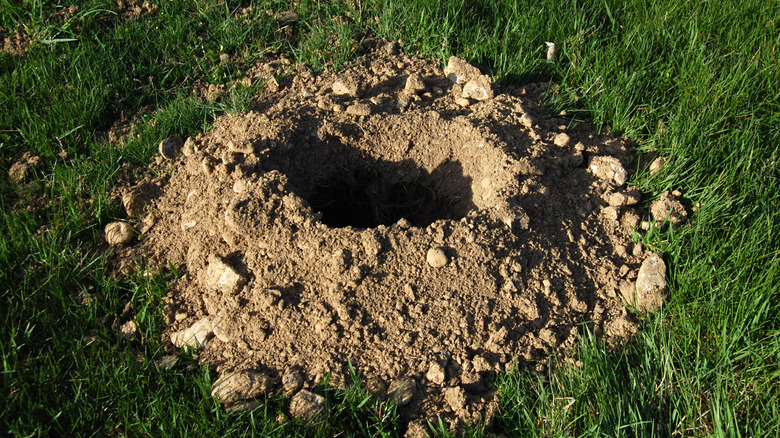The Best Way To Keep Groundhogs From Burrowing Under Your Shed
Groundhogs, often found burrowing near sheds and decks, can significantly damage property and yards. Their digging can destabilize foundations, leading to expensive repairs. Furthermore, they might chew on underground electrical cables, posing safety risks and costly repair bills. Beyond property damage, these critters can devastate gardens and crops by destroying root systems and treating them as food sources. Their dens, characterized by large mounds and holes, can be tripping hazards for people, posing potential liabilities for property owners. Additionally, groundhogs can display aggression, especially when confronted or pursued, adding to the list of concerns for property owners. However, there are ways to trap and remove them, and prevent groundhogs from getting access to your yard in the first place.
Live-trapping stands out as a favored solution to effectively address a groundhog issue under your shed or porch. Using live traps, you can catch and relocate these animals efficiently. These traps are readily available for purchase, or you can hire a removal service. After successfully trapping the groundhog, relocation is vital. To prevent its return, it's recommended to release the groundhog at least 10 miles away, preferably in a natural habitat like woods or meadows, and away from human dwellings, ensuring the animal's safety and the peace of mind for property owners.
Tips for successfully trapping and relocating groundhogs
There are a few tips to keep in mind for successfully trapping a groundhog. First, cleaning the trap is crucial to eliminate any human odors. Wearing rubber gloves during handling can further prevent the groundhog from sensing your presence. Be sure to set the trap on flat terrain near the burrow's entrance and camouflage it using soil, twigs, and leaves. Entice the groundhog by baiting the trap with fruits like bananas or apples, or even vegetables. Enhance its attractiveness by adding a few drops of woodchuck lure, which can draw the groundhog more quickly. As an alternate option, consult your local animal shelter for guidance on relocation or to hand over the captured animal.
To deter groundhogs from your property, consider implementing multiple preventive measures. Installing exclusion fencing around your yard's perimeter can prevent groundhogs from digging underneath. Additionally, sealing gaps at the base of sheds or porches with wire mesh discourages other groundhogs from taking residence. An electric fence or one embedded into the ground can be especially effective in keeping them at bay. Pouring ammonia around sheds and into burrows is another inexpensive deterrent option. Lastly, consistent yard maintenance, including trimming grass and shrubbery, deprives groundhogs of the cover they seek for protection, making the area less attractive.

